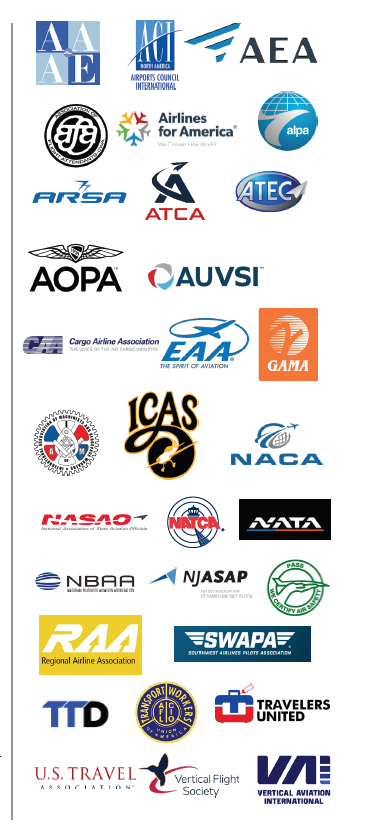December 20, 2024
The Honorable Chuck Schumer
U.S. Senate Majority Leader
S–221 The Capitol
Washington, DC 20515
The Honorable Mitch McConnell
U.S. Senate Minority Leader
S–230 The Capitol
Washington, DC 20515
The Honorable Mike Johnson
Speaker of the U.S. House of Representatives
H-232, The Capitol U.S. House of Representatives
Washington, DC 20515
The Honorable Hakeem Jeffries
Minority Leader
2267 Rayburn House Office Building
Washington, D.C. 20515
Dear Leader Schumer, Leader McConnell, Speaker Johnson, and Leader Jeffries,

A unified aviation community writes to respectfully urge you to take immediate action to avoid a harmful government shutdown on December 21. Government shutdowns harm our economy and degrade the redundancies and margins of safety that our National Airspace System (NAS) is built upon. In fact, short-term shutdowns of just a few days and even threatened shutdowns that are averted in the eleventh hour can negatively affect the aviation system and the traveling public.
The NAS moves over 45,000 flights, 2.9 million passengers, and more than 59,000 tons of cargo every day across more than 29 million square miles of airspace. It is the safest, most efficient and most complex system in the world.
Shutdowns are extremely detrimental to the Federal Aviation Administration (FAA) by suspending air traffic controller hiring and training, delaying the implementation of safety initiatives, postponing maintenance and repair work to critical air traffic equipment, suspending air carrier pilot check rides, delaying airworthy inspections for aircraft, deferring the analysis of voluntary safety reporting, and suspending work on modernization and infrastructure programs. During a shutdown, many FAA employees are furloughed, meaning that they cannot perform their duties that support aviation safety, aircraft certification and the integration of new entrants. The ensuing backlogs cause further delays in these critical FAA services long after funding resumes.
While air traffic controllers will continue to work without pay, many of the employees who support them are furloughed, and the programs that the FAA uses to review and address safety events are suspended. To remain the world leader in aviation, we must continue to strive to improve efficiency and further mitigate risk.
The air traffic controller staffing shortage continues to be a critical problem, and a shutdown would make the problem worse by delaying an already-lengthy hiring and training process. A shutdown requires the FAA to suspend all hiring and close its training academy in Oklahoma City, which takes additional time to restart after a shutdown ends.
Furthermore, shutdowns are both costly and harmful to our economy. Commercial aviation in the U.S. contributes more than 5% to the gross domestic product, accounting for $1.37 trillion in 2023, while also helping to drive more than 10 million American jobs. Government shutdowns severely hinder this economic activity. The Congressional Budget Office’s analysis found that the 35-day shutdown in December 2018 through January 2019 cost the U.S. economy $3 billion in forgone economic activity that was never recovered.
Congress must work quickly to avoid another harmful shutdown. The FAA, its dedicated frontline workforce, our aviation community and our economy cannot afford a disruption, regardless of how long it lasts.
Sincerely,
Aeronautical Repair Station Association (ARSA)
Aircraft Electronics Association (AEA)
Aircraft Owners and Pilots Association (AOPA)
Air Line Pilots Association, Int’l (ALPA)
Airlines for America (A4A)
Airports Council International-North America (ACI-NA)
Air Traffic Controllers Association (ATCA)
American Association of Airport Executives (AAAE)
Association of Uncrewed Vehicle Systems International (AUVSI)
Aviation Technician Education Council (ATEC)
Cargo Airline Association (CAA)
Experimental Aircraft Association (EAA)
General Aviation Manufacturers Association (GAMA)
International Association of Machinists and Aerospace Workers (IAM)
International Council of Air Shows (ICAS)
National Air Carrier Association (NACA)
National Air Traffic Controllers Association (NATCA)
National Air Transportation Association (NATA)
National Association of State Aviation Officials (NASAO)
National Business Aviation Association (NBAA)
NetJets Association of Shared Aircraft Pilots (NJASAP)
Professional Aviation Safety Specialists (PASS)
Regional Airline Association (RAA)
Southwest Airlines Pilots Association (SWAPA)
Transport Workers Union (TWU)
Transportation Trades Department, AFL-CIO (TTD)
Travelers United
US Travel Association (USTA)
Vertical Aviation International (VAI)
Vertical Flight Society (VFS)
cc: Senate Appropriations Chair Patty Murray, Senate Appropriations Vice Chair Susan Collins, House Appropriations Chairman Tom Cole, House Appropriations Ranking Member Rosa DeLauro, Senate Commerce Chair Maria Cantwell, Senate Commerce Ranking Member Ted Cruz, House Transportation Chairman Sam Graves, House Transportation Ranking Member Rick Larsen